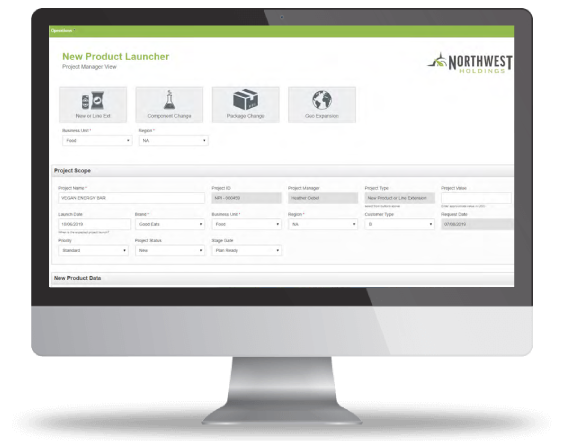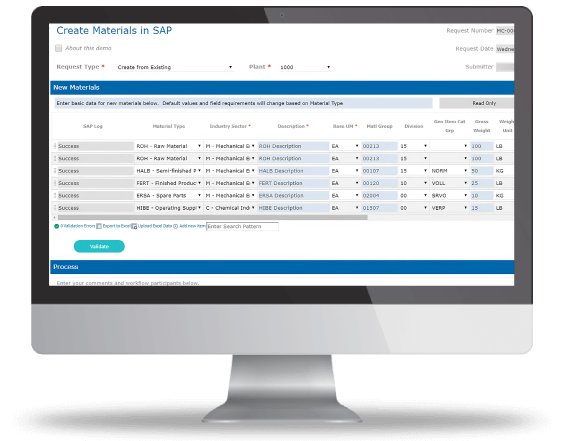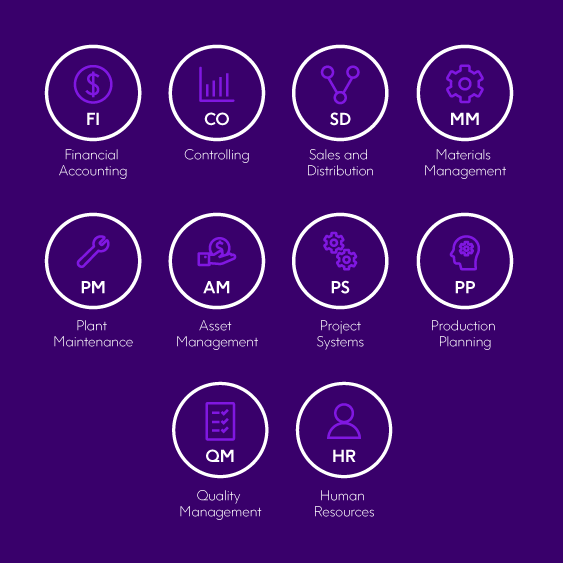eBook
Evolving Digital Into a Competitive Advantage
Why you need a differentiated digital transformation strategy for your SAP® business processes
If you’re responsible for digitizing processes in your SAP ERP and other satellite systems, this eBook is for you. We’ll explore why automating SAP processes is vital for the overall success of your digital transformation efforts and why you need differentiated strategies and platforms to tackle automating processes in your digital core.
You’ll discover the capabilities you need to automate SAP processes successfully and how choosing the right platform will enable you to digitize at the speed and scale demanded by today’s dynamic economy.
“67% of global CEOs agreed with the statement, acting with agility is the new currency of business; if we are too slow, we will be bankrupt.”
KPMG’s 2019 CEO Outlook

Digital transformation as a competitive strategy
For many large organizations, SAP ERP systems form a crucial part of their digital core, which is supplemented by best-of-breed applications in areas such as customer experience, supply chain management, and asset management.
The need to go faster and be more agile has never been greater as large organizations compete with smaller, nimbler digital-native enterprises. Analysts and business leaders agree that digital transformation is a top strategic priority in the coming years if large organizations are going to survive in an increasingly dynamic and competitive global economy. And the investment dollars are following.
“It is already clear from our research that the businesses which have invested heavily in DX* over the last 2-3 years are already reaping the rewards in terms of faster revenue growth and stronger net profits compared to businesses lagging in DX initiatives and investments.”
Craig Simpson Research Manager, IDC *DX- Digital Transformation
Where the digital transformation (DX) dollars are going
$2.3 Trillion
Will be spent on DX technologies and services annually by 2033
53%
Accounting for more than half of technology investment and up 36% in 2019
$253 Billion
The software portion of DX spend projected for 2019
Significant areas of spend
Automatic operations
$52 Billion
Robotic manufacturing
$45 Billion
Freight management
$41 Billion
Root cause
$35 Billion
These three industry segments account for almost half of that spend in 2019:
Manufacturing
Retail
Transportation
Honorable mentions for categories with more than $20 billion of expenditure:
Self-healing assets and augmented maintenance
Intelligent & predictive grid management for electricity
Quality and compliance
Why automating processes in your digital core is key to success
For many large organizations, SAP ERP systems form a crucial part of their digital core, which is supplemented by best-of-breed applications in areas such as customer experience, supply chain management, and asset management.
In the clamor to digitize, companies tend to focus on these satellite ecosystems and the connections between them. What often gets overlooked, however, is the need to automate processes in the digital core itself—an oversight that can diminish or even negate the benefits of your other digitization efforts.
For example, the ability to mine social media platforms in the customer ecosystem for demand trend signals can be a real advantage. Still, if it takes your organization three months to collect the product data needed to manufacture a new product variant, the market has probably moved on.
If you’re an experienced SAP practitioner, you know that even though your ERP is itself a digital platform, there are a lot of manual processes involved with its care and feeding. From setting up new material master data to entering journal entries, there are a lot of opportunities for automation.
So, although automating underlying SAP processes may not be as topical as other efforts—like using blockchain technology to track supply chain—it’s an essential part of any digitization strategy. It will give you the solid foundation you need to realize the speed, market intelligence, customer experience, and, ultimately, the competitive benefits of your digitization initiatives.
Processes in your satellite ecosystems rely on key data being available in your SAP ERP system. That data must be right and available when the business needs it to realize the full benefits of digital transformation.
Digitizing strategic data processes in your SAP core
There is no shortage of SAP processes to automate, but there’s a class of SAP processes that’s vital to tackle if you’re going to realize the full benefits of your digitization efforts in your satellite systems. We call this class strategic data processes. These are the processes that create and manage the data on which your critical business operations like manufacturing, sales order processing, invoicing, and plant maintenance rely.
In this section, we’ll walk through some examples of strategic data processes and what capabilities you need to automate them successfully.
Strategic data process examples
Launching a new product in SAP is a prime example of a strategic data process. Before a single machine in any plant can make a
new product, you need to set up a massive amount of data—with materials being just the tip of the iceberg.
Collecting and entering this data is often a slow, manual process that involves many departments, lots of emails, spreadsheets, and manual data entry—making this process a prime candidate for automation. And just one mistake in critical data elements such as weight and measures can have costly downstream consequences.
Similarly, you can have a streamlined sales process and sophisticated CRM. But, you can’t take orders or ship products without first setting up customer master records in SAP—which can take days or even weeks if done manually. And mistakes or omissions in customer data can lead to shipping and invoicing problems, increased cost, and poor customer satisfaction—diminishing all the hard work done at the beginning of the relationship.
Maintaining plants and equipment also depends on masses of high-quality master data. Technicians can use IoT (Internet of Things) technology to get sensor readings from a pump in the field but won’t be able to carry out the right preventative maintenance work if the necessary plans and task lists aren’t set up in your system—or are missing essential data.
Characteristics of strategic data processes
- The data supports critical business processes
- Getting the data wrong has costly consequences
- Collecting data is complicated and involves many teams
- The data is complex and can span many objects
- There’s a high volume of data create/change requests
Data, business rules, and processes:
- Vary across business units and geographies
- Are subject to audit
- Must be compliant
- Change frequently
Automating strategic SAP data processes like product launches requires a sophisticated platform like Automate Evolve, which combines enterprise-grade automation, robust data stewardship, and deep SAP integration capabilities.
Why automating strategic data processes needs a different class of software
Master data management platforms excel at enforcing business rules and syndicating a small number of data fields in a few core domains but are not designed to streamline the complex processes associated with setting up and maintaining the data.
Traditional business process automation and business process management platforms, on the other hand, are great at digitizing simple tasks like customer inquiries and contract reviews. They work well for routing documents but are not designed to automate complex SAP data processes and do little or nothing to improve data quality.
To successfully digitize data-intensive processes in your ERP system at a cost point and in a timeframe and that makes sense for your business, you need a different class of automation software that offers a unique combination of capabilities.
Automate Evolve:
- Enterprise-grade workflow and automation
- Robust data stewardship
- Deep SAP integration
- No-code, low-code solution authoring
In this section, we’ll highlight some must-have platform capabilities needed for success when digitizing strategic data processes.
Must-have capabilities for automating strategic data processes
Must-have capability:
Dynamic process linking
Data-intensive processes in your digital core, like product launches or vendor onboarding, are complex—involving multiple departments and data objects. Data must be collected in a specific order, and while some of that data can be supplied centrally, a lot must be collected in a decentralized fashion by plants, sales organizations, etc.
Your automation solution must be flexible and powerful enough to dynamically kick off the right processes and sub-processes based on the parameters you set to collect the right data at the right time wherever it resides.
Let’s walk through a simplified product launch example to illustrate this point.
In this case, we want to create five new related finished goods. A project manager specifies upfront which plants will be manufacturing which of the new products. The automation solution then sends a form to the relevant people to collect the global data needed to create the shell materials for each of the five products.
Next, the right subprocesses are spawned at each of the relevant plants to complete the collection of the material master data. And because each subprocess is independent, plants can work at different cadences. As the diagram shows, the automated process can also collect or update data across related objects like routings, PIRs, BoMs, or source list for end-to-end automation.
Must-have capability:
Enterprise-grade automation
In addition to being able to dynamically link processes, the automation platform you choose must have the following enterprise-grade workflow and automation features:
- Smart logic to drive workflow steps and data collection needs
- Parallel task assignment to speed processes
- Email notifications, SLA tracking, and task reassignments to keep projects on track
- Support for attachments to improve compliance
- Dashboards & reports to get more visibility into process status
Must-have capability:
Robust data stewardship
The consequences of poor quality strategic data in your SAP system are real and costly, making a robust set of proactive data stewardship capabilities an essential part of any platform used to automate processes in your digital core.
Must-have capabilities include:
- The ability to search for existing records to avoid creating duplicates
- SAP F4 lookups from within web forms or Excel to make the right field value easier
- Forms tailored to job roles and the step in the process to speed data input and avoid errors
- Live SAP validation to prevent bad data from getting into the system Modified drop-down lists to choose the right field value
- The ability to specify required fields without SAP configuration
- The ability to copy from existing clean records to save time and improve data quality
Must-have capability:
Choice of the front end-forms or Microsoft Excel
There are times when you need to create or update one or a handful of records and other times where hundreds or thousands need to be touched. It’s essential to choose an automation platform that can handle all these use cases.
Automate Evolve enables business users to either work in web forms or use Excel workbooks to input or approve data, eliminating the need to use the SAP GUI. This automation platform includes patented SmartTable technology—a unique form element that enables your business teams to process multiple records in a single form, like creating ten ship-to customer records or launching sixteen new variations of an existing product.
SmartTables combine the ability to process multiple records simultaneously while enjoying all the data stewardship capabilities inherent with web forms—like required fields, smart form logic, role-based web views, and field standardization.
SmartTables are patented web form elements that are included with Automate Evolve, an automation platform specifically designed to automate strategic SAP data processes. SmartTables enable business users to create or update multiple related records in a single web form.
Must-have capability:
Flexible, extensible solution architecture
It’s critical to choose a platform that can support the different processes and data needs of your regions, product lines, or business units in one automation solution. Having this level of flexibility enables you to digitize faster and make a greater impact.
Extensibility is also a key consideration given tight timelines and budgets. You need to be able to automate parts of your strategic data processes and expand your automation footprint over time.
Must-have capability:
Ability to digitize processes across your SAP landscape
To make the maximum impact on your business, you need to digitize processes across your SAP landscape. Look for an automation solution designed to work with the core modules of your SAP ERP system—both on ECC and S/4HANA.
Must-have capability:
No-code, low-code authoring
To digitize SAP processes at a pace that the business demands, you can’t just rely on your core SAP IT teams, who are already resourceconstrained. That’s why it’s critical to choose an automation platform that people in or close to the business can use to author and modify automation solutions without needing SAP programming skills.
Of course, any automation solution you deploy that touches SAP must fully respect SAP user permissions, exchange data via secure protocols, and have controls in place to ensure system performance. With this business-led, IT-enabled approach, you can digitize at scale, and make changes quickly to keep pace with dynamic market conditions.
Processes in your satellite ecosystems rely on key data being available in your SAP ERP system. That data must be right and available when the business needs it to realize the full benefits of digital transformation.
Conclusion
In this paper, we’ve examined why it’s critical to automate processes in your digital core to ensure you reap the full benefits of other digitization efforts in ecosystems such as customer, supplier, product, and physical assets.
We’ve learned that traditional automation and master data management platforms are not designed to digitize the complex strategic data processes that underly business-critical manufacturing, supply chain, sales, and finance operations.
Finally, we’ve laid out some of the must-have capabilities when it comes to automating these strategic data processes in your SAP digital core. Capabilities that will ensure you can digitize at a pace, scale, and price point that enables your business to compete and thrive in today’s fast-paced digital economy.







